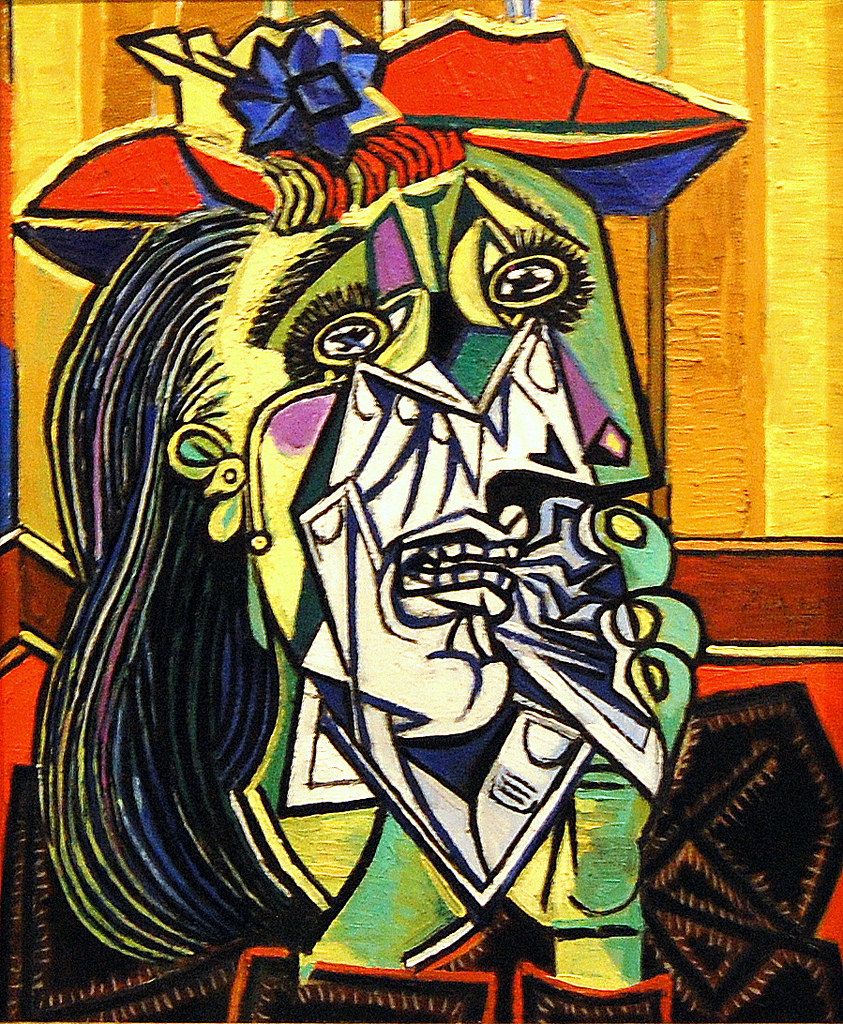
I Do Not Want To Be Your Weeping Woman (by Alison Boordson)
I do not want to be your weeping woman
holding you to me with a chain of grief.
I could more easily bear the flames of your anger
than the frost of your kisses empty of desire:
I do not want to be your gentle lover
dragging you to me on a rope of pity.
Sooner that you never touched me than that you ever
should touch me from a distance made of mercy:
I do not want to be your silent mother
always forgiving and smiling and never loving.
If you forget me, forget me utterly. Never
come to my arms without interest: I shall know it:
I do not want to be your weeping woman
pinning you to me with a sword of tears.
I do not want to be your weeping woman.
The poem is full of repetition to emphasize the image of a woman who does not want to hold a man because she arouses his pity in a sort of emotional blackmail, but wants to be loved for what she really is
The frequent use of the pronoun “I” at the beginnings of some neighbouring stanzas is a kind of anaphora, i.e. the repetition of a word or a sequence of words at the beginning of two or more successive verses, clauses, or sentences, to give them emphasis. (In contrast, an epistrophe or epiphora is the repetition of words at the end of the clauses).
Non voglio essere la tua donna che piange
Non voglio essere la tua donna che piange
Che ti trattiene con una catena di dolore.
Potrei sopportare più facilmente le fiamme della tua rabbia
che il gelo dei tuoi baci è svuotati di desiderio:
Non voglio essere la tua dolce amante
Che ti trascina verso di me con una fune di pietà.
Preferisco non essere toccata piuttosto che tu lo faccia
Toccandomi da una certa distanza fatta di compassione
Non voglio essere la tua madre silenziosa
sempre clemente e sorridente e mai affettuosa.
Se mi dimentichi, dimenticami completamente. Mai
Devi venire tra le mie braccia senza interesse: io lo saprò:
Non voglio essere la tua donna che piange
Che ti inchioda a me con una spada di lacrime.
Non voglio essere la tua donna che piange.
(L.Z.)
Buon pomeriggio Luisa💕
“Il silenzio delle donne…”…continua…
LikeLiked by 2 people
Vero, Caterina
Ti auguro una buona serata!
💕
LikeLike
stupenda… ma dove le trovi, Luisa? Ti immagino come qualcuno che legge molto e dagli interessi più disparati. Questa comunque la trovo particolarmente bella sia per stile che per contenuti
LikeLiked by 2 people
Le cerco… in un’altra vita dovevo essere un topo da biblioteca.
Questa poi mi serviva da abbinare alla canzone “That’s what I like about you”, insieme a un’altra poesia che pubblicherò domani, che ho presentato al corso che tengo all’Università per la Terza Età del mio paese
LikeLiked by 1 person
Ecco, lo sapevo troppo che eri un’intellettuale, amante dei libri e della cultura 😊 ti leggo sempre con piacere comunque, non so come sia possibile ma le cose che pubblichi mi infondono serenità. Forse mi capitano sotto gli occhi tante schifezze insensate e trovo conforto nel bello, o per lo meno quello che è bello per me!
LikeLiked by 1 person
Flavia carissima, grazie per le belle parole di incoraggiamento.
Anch’io seguo il tuo blog con molto interesse e mi gusto le tue foto eccezionali con estremo piacere.
Buona giornata!
LikeLike
Grazie Luisa😊❤️comunque si dice che la bellezza è negli occhi di chi guarda!
LikeLiked by 1 person
Un abbraccio a te
🤗🤗🤗
LikeLike
Magnifique article !
LikeLiked by 2 people
Merci beaucoup et bonne soirée
LikeLike
Reblogged this on Stardust.
LikeLiked by 1 person
Thank you for reblogging
❤
LikeLiked by 1 person
Great post ! worth rebloggining !
LikeLiked by 1 person
Thank you again!
LikeLiked by 1 person
Tua personale ? Molto bella bastassero le mie lacrime a inchiodarli, forse non ho mai davvero pianto per qualcuno che mi piaceva davvero, sarà per questo che ne conservo un ricordo perfetto. Grazie della poesia mi ci voleva.
LikeLiked by 2 people
No, è di un’autrice (Alison Boordson) di cui però non sono riuscita a scoprire nulla. Mia è solo la traduzione.
Comunque i sentimenti, i desideri espressi sono anche i miei
Buona giornata!
LikeLike
Autrice riservata
LikeLiked by 1 person
Sì 👩
LikeLike
“Non voglio” is the beginning of freedom. 🙂
Ciao, ciao.
LikeLiked by 2 people
Yes, you are right. and sometimes it takes a lot of strength to be able to say it convincingly
LikeLiked by 1 person
Absolutely. NO is the hardest thing to say. 😉
LikeLike
I agree with you!
🙂
LikeLiked by 1 person
I love the beautiful Picasso! The poem complements it perfectly 💕🙂
LikeLiked by 2 people
Thank you for your kind comment, dear Christine.
Have a beautiful day ahead
LikeLiked by 1 person
You too Luisa!
LikeLiked by 1 person
🌺 🌷 🌺 🌷
LikeLike
Nice poetic expression and image depiction.💕💕💕
LikeLiked by 2 people
Thank you so much, I am glad you like both of them
Thank you for dropping by
💜💚
LikeLike
💕💕💕
LikeLike
non conosco questa autrice che riporti in italiano con estrema cura e grazia poetica
LikeLiked by 2 people
Purtroppo non so dirti nulla di lei, perché non ho trovato nessuna informazione in rete. Ritengo che questa sua poesia sia davvero bella.🌼
LikeLiked by 1 person
LikeLiked by 2 people
This is gorgeous
Thank you so much!
🐈 🐱
LikeLiked by 1 person
Potent and brooding, passionate, wow.
LikeLiked by 2 people
I am pleased that you liked this poem too.
I thought it was quite beautiful
LikeLiked by 1 person
Yes indeed
LikeLike
🌸🌸
LikeLike
Reblogged this on Alessandria today.
LikeLiked by 2 people
Grazie! 🌹
LikeLike
Reblogged this on Alessandria today.
LikeLiked by 1 person
Grazie! ❤️😊
LikeLike